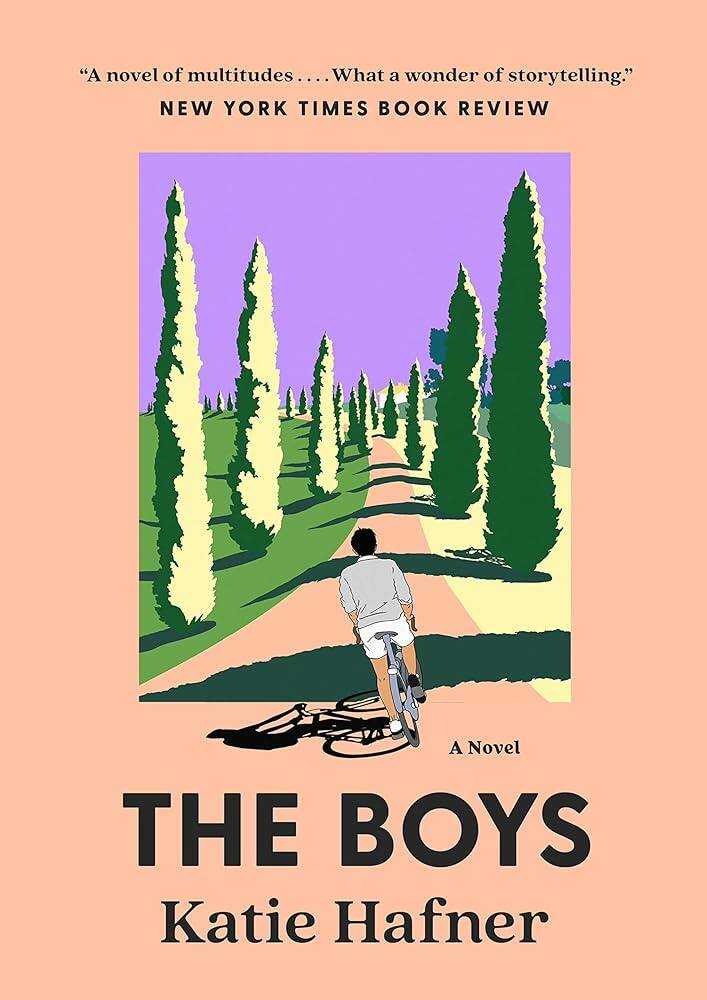I’ve written before about how difficult it is for me to read novels in which the COVID-19 pandemic plays a central theme. The virus doesn’t feel far enough in the past to have already become a subgenre of historical fiction, and trying to stay focused on books about the pandemic often ends with me staring into space, lost in my own memories.
When I started reading Katie Hafner’s “The Boys,” I didn’t know that it was about the COVID-19 pandemic. (Nor did I know I would contract COVID-19 a week later, but that’s beside the point.) The book lured me in with a bright pastel cover and a mysterious summary, and I took the bait.
Hafner is a former staff writer at The New York Times, where she wrote about health care and technology for 10 years and is now a frequent contributor. “The Boys,” is her first novel, and it maybe makes sense that those topics are motifs throughout.
“The Boys,” follows the reclusive Ethan Fawcett, who falls in love with outgoing Barb. As their relationship progresses, Ethan’s childhood trauma causes problems as they look to begin a family.
It’s difficult to summarize the plot of “The Boys” without giving away some of the details or plot points that make it such a compelling read. Ethan and Barb are both lovable protagonists who feel so real, it’s like you’ve met them before. The love story is a charming tale of introvert-meets-extrovert, in which their differences complement each other and nurture their comfortable life founded on mutual respect.
Underlying that story, though, is a darker tone stemming from Ethan’s loss of his parents as a child. The incident leaves him with a fear of parenthood that creates wrinkles in their marriage and prompts Barb to bring home two boys — yes, the boys — as a sort-of parenting trial run. Ethan’s bond with the boys is immediate and runs deep — deeper than Barb’s, in a way that drives the couple apart.
What feels as true-to-life as the characters is the way Hafner portrays the toll forced isolation can take on the human psyche within the context of the COVID-19 pandemic. In my experience, stories about the COVID-19 pandemic play up the same themes and imagery associated with other depictions of pandemics in media: tired doctors, sick loved ones, global panic.
All of those, of course, were elements of the COVID-19 pandemic. What resonated with me about “The Boys,” though, was Hafner’s depiction of how forced isolation — quarantine and social distancing — exacerbated Ethan’s already severe introversion. His character pushes the concept to its limit, pulling at the loose thread of the idea until the whole sweater has unraveled.
His story is a sympathetic one. “The Boys” is a novel without an antagonist. As in life, it’s not always easy to identify what is driving the conflict; people have good days and bad days, and don’t always behave like you expect them to.
“The Boys,” is not the first book to dramatize the COVID-19 pandemic, and it certainly won’t be the last. As authors duke it out for their own slice of that niche literary canon, I think “The Boys” will stand out as an eccentric and endearing story of human connection as essential
“The Boys,” was published in 2022 by Spiegel & Grau.
Reach reporter Ashlyn O’Hara at ashlyn.ohara@peninsulaclarion.com.
Off the Shelf is a bimonthly literature column written by the staff of the Peninsula Clarion.

